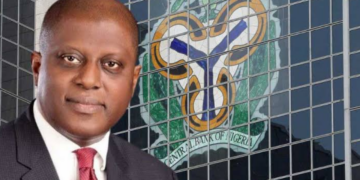The Tertiary Education Trust Fund (TETFund) has continued to stand tall as a symbol of transformation, progress, and renewed hope accross tertiary institutions.
The Fund has evolved into one of the most impactful public institutions driving the renewal of higher education in the country.
From expansive lecture theatres and laboratories to research centres, libraries, and ICT hubs, TETFund’s projects have become landmarks of development across campuses.
Over the years, the Fund has sustained an unwavering mission to bridge gaps in physical infrastructure, strengthen academic research, and enhance the overall quality of learning in Nigeria’s tertiary institutions.
Through consistent interventions, TETFund has helped to reposition higher education as a catalyst for national development. Its presence is evident not only in the structures it erects but also in the opportunities it creates, empowering lecturers through capacity-building programmes, supporting innovation, and promoting indigenous solutions to academic and societal challenges.
Despite the country’s harsh economic climate, inflationary pressures, and fluctuating exchange rates, TETFund has remained steadfast in delivering on its mandate. Institutions across Nigeria testify to the Fund’s strategic interventions that have improved learning environments, encouraged accountability in project execution, and inspired confidence in public investments in education.
Its model of transparent disbursement and rigorous monitoring ensures that every project contributes meaningfully to the academic mission of beneficiary institutions.
Today, the story of many public universities, polytechnics, and colleges of education cannot be told without mentioning TETFund.
From state-owned institutions in the North to federal universities in the South, its footprint has become an integral part of Nigeria’s educational infrastructure.
In many campuses, newly built lecture theatres, laboratories, and faculty complexes bear testimony to the Fund’s enduring contribution to teaching, research, and innovation.
The commissioning of the new Faculty of Social Sciences Lecture Theatre and Office Complex at Nasarawa State University, Keffi (NSUK), is one more chapter in this unfolding narrative of impact.
At NSUK, that commitment once again came to life with the commissioning of a N717,374,213.75 Faculty of Social Sciences Lecture Theatre and Office Complex.
The event, presided over by the Chairman of TETFund’s Board of Trustees, Hon. Aminu Bello Masari, marked another milestone in the Fund’s long-standing mission to transform the learning environment in Nigerian universities.
The new edifice, featuring 22 en-suite offices, four 200-seater lecture theatres and 12 public conveniences, stands as a model of functional educational infrastructure and prudent fund management.
Speaking at the commissioning, Hon. Masari, a former governor of Katsina State, said the project was executed under the 2020/2021 merged annual intervention and aligns with President Bola Ahmed Tinubu’s Renewed Hope Agenda.
He praised the university’s management for its exemplary record in project implementation, noting that this was the third TETFund project to be commissioned at NSUK in less than three years.
“It shows the institution’s resolve to ensure funds are judiciously used with verifiable results. This fused lecture theatre and office complex is a product of the 2020/2021 merged annual intervention, hosted under the Faculty of Social Sciences.
“We are optimistic that this facility will aid teaching and learning in a comfortable environment, having been furnished and adequately equipped for that purpose.”
According to Masari, TETFund has achieved about 71 per cent completion of infrastructure-based projects across its beneficiary institutions between January and September 2025.
This, he said, is a testament to the Fund’s commitment to accountability, efficiency and results-oriented interventions.
He revealed that since Nasarawa State University became a TETFund beneficiary in 2003, it had received over N12.7 billion for infrastructure-related projects, with 80 per cent of those funds already accessed and utilised. “The evidence of utilisation is visible all over this campus,” Masari added.
While commending the university for prudent management, Masari also charged the institution to maintain the facility and uphold a strong maintenance culture.
“We have seen too many public buildings deteriorate within years of commissioning,” he cautioned. “Our goal is to build infrastructure that will stand the test of time and serve generations of students and scholars.”
The TETFund chairman further reaffirmed the organisation’s commitment to supporting innovation, ICT advancement and sustainable power solutions in tertiary institutions.
He disclosed that the Fund had temporarily stepped down foreign training for lecturers due to the impact of high exchange rates and frequent cases of beneficiaries absconding abroad.
“We are focusing more on impactful local interventions that will yield appreciable dividends soon. This new focus aligns with the Fund’s broader strategy to build capacity within the country’s higher education system through home-grown solutions.
Representing the Executive Secretary of TETFund, Arc. Sonny Echono, the Fund’s Director of Monitoring and Evaluation, Mr Babatunde Olajide, described the project as a reflection of TETFund’s determination to strengthen Nigeria’s tertiary education system despite economic challenges.
“This event stands as a testament to our shared commitment to advancing tertiary education in Nigeria. We commend the university for its prudent utilisation of funds and timely completion of projects. Despite inflationary pressures and exchange rate volatility, institutions like NSUK continue to demonstrate resilience and integrity.”
He urged universities to prioritise maintenance and ensure that every new structure remains in optimal condition for future generations. “Together, we can ensure this investment yields dividends for decades to come,” he added.
In her remarks, the Vice-Chancellor of Nasarawa State University, Professor Sa’adatu Hassan Liman, expressed deep appreciation to TETFund for its continuous support, describing the day as “a momentous occasion in the institution’s history.”
According to her, TETFund’s interventions have been pivotal in expanding access to education, improving staff welfare, and creating an environment conducive to academic excellence.
“This magnificent structure has been proudly sponsored by TETFund. It will promote teaching, enhance research, and create a truly conducive environment for our students,” she said.
Professor Liman noted that NSUK was recently ranked the Number One University in Nigeria for Quality Education by the 2025 Times Higher Education Impact Rankings under Sustainable Development Goal (SDG) 4—an achievement she attributed to TETFund’s support and consistent collaboration.
She assured the Fund that NSUK remains committed to accountability, transparency and due process in managing intervention projects, while appealing for more support for new lecture theatres, additional faculty buildings and solar energy solutions to strengthen the university’s infrastructure.
Governor Abdullahi Sule of Nasarawa State, represented by the State Commissioner for Education, Dr John Mamman, also commended TETFund for its sustained investment in tertiary education. He reaffirmed the state government’s commitment to creating a supportive policy environment for universities and colleges to thrive.
Beyond Nasarawa, TETFund’s infrastructure drive has been equally visible in the South-East, particularly at the Institute of Management and Technology (IMT), Enugu, where the Fund recently commissioned five major projects worth over N1.06 billion.
The projects, completed under TETFund’s special intervention programme represent a blend of innovation, resilience and partnership.
At the commissioning ceremony, which drew government officials, academic leaders and development partners, the Board’s representative, Mrs Esther Onyinyechukwu Ukachukwu, lauded IMT’s management for ensuring transparency and timely delivery despite economic headwinds.
“The completion of these projects is not just an achievement for IMT, but a reflection of what transparency and determination can achieve in our public tertiary institutions. Out of N7.24 billion allocated to IMT for infrastructural development over the years, the school has successfully accessed N6.22 billion and delivered on key projects transforming its learning environment.”
She reaffirmed TETFund’s resolve to sustain interventions that drive innovation, particularly in areas of digital learning and artificial intelligence.
Echoing the same sentiments, Executive Secretary Arc. Sonny S. T. Echono commended IMT for its prudent resource management. “Institutions like IMT have demonstrated that with integrity and good management, public funds can achieve their purpose. Even with fluctuating market conditions, they have remained focused and delivered results.”
Echono revealed that TETFund had approved additional allocations to assist institutions struggling with stalled or distressed projects, an effort already yielding tangible results nationwide. He, however, emphasised the importance of maintenance culture.
“Our work does not end at commissioning. Maintenance is what ensures sustainability,” he noted.
For his part, IMT Rector, Professor Gozie Ogbodo, said the institution was committed to maintaining all TETFund-supported facilities.
“Every project you see today has been freshly painted and refurbished. Our aim is to create a modern and functional learning environment that inspires both students and staff,” he added.
Through its blend of transparency, accountability and targeted investment, TETFund has helped transform once-dilapidated campuses into vibrant centres of learning and research.
Despite economic challenges, the Fund’s ability to sustain projects and deliver impactful results demonstrates what is possible when public institutions prioritise service over bureaucracy.
As universities like NSUK, IMT and many others continue to reap the benefits of these interventions, TETFund’s infrastructure legacy is proving to be more than just concrete and steel, it is a catalyst for the rebirth of higher education in Nigeria.





